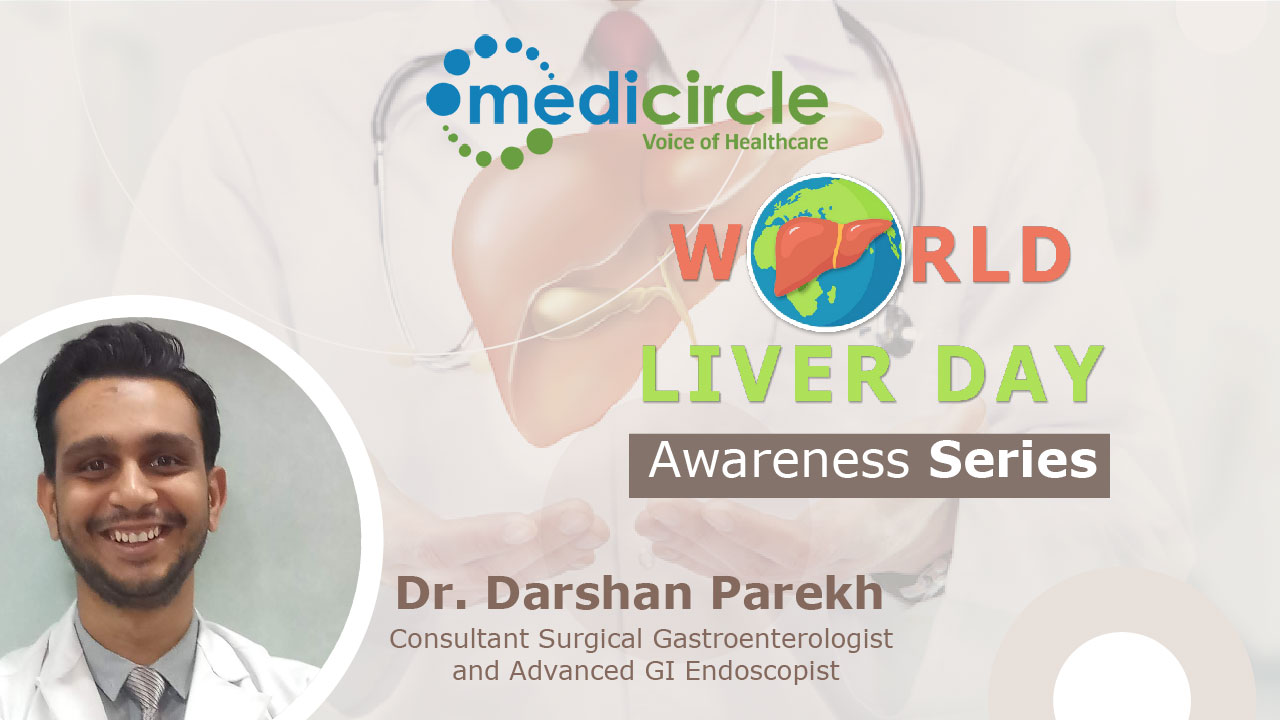The liver is the second largest organ in our body. It is a key player of the body’s digestive system and it contributes to the digestive functioning for effective metabolism. Over the past decade, there has been a steady rise in the number of cases of liver disease. World Liver Day is observed in the month of April every year. To spread awareness about the healthy functioning of the liver, Medicircle is speaking to eminent gastroenterologists and hepatologists.
Dr. Darshan Parekh is a Consultant Surgical Gastroenterologist and Advanced GI Endoscopist. He has done his Masters in General Surgery from Dr. Vasantrao Pawar Medical College, Nashik under Maharashtra University of Health Sciences. He has done a Fellowship in Gastroenterology and Advanced Therapeutic GI Endoscopy at Lokmanya Tilak Municipal Medical College and General Hospital, Mumbai. He is proficiently trained in diagnostic and therapeutic endoscopy including ERCP and endo-sonography for treating various complex HPB disorders. He has immense experience in gastroenterology with vast practice all over Mumbai. He is a visiting consultant in more than ten hospitals in the city. Dr. Parekh also has a number of original publications in national and international journals and is actively involved in research protocols.
Liver – the powerhouse of our body
Dr. Parekh mentions, “The liver is like the powerhouse of our body. So almost every function of the body is linked to the liver. So basically, what happens is that when the liver starts nonfunctioning, what you realize is that almost every part of your body starts getting affected. If you put it in plain words, then the main function of the liver is to regulate the metabolism of the body. The three main metabolisms that the body requires are proteins, glucose, and fats. The liver participates in all three. Basically, when we eat food, we eat carbs, or we eat proteins or we eat fat. So, when we are eating these three, they are digested by the stomach and the intestines, and then these nutrients are absorbed by the intestines and the blood takes them to the liver. The liver is what metabolizes and regulates it. It keeps what the body requires and it excretes what the body does not require. So, this is a very complex process, because every metabolism has a lot of enzymes and it's a huge pathway. So, all the enzymes are produced by the liver,” explains Dr. Parekh.
Liver produces “antibodies” - not just for covid-19 but other diseases as well
Dr. Parekh informs, “Liver produces a lot of proteins which help in the functionality of the body. It produces certain clotting factors which are required for blood clotting. It produces a lot of antibodies. We have been hearing of the term “antibody” a lot right now because of Covid-19. Basically, the protein which is required for these antibodies is produced in the liver and it’s not just for covid, rather it protects us from a lot of other diseases. So, proteins which are required for these antibodies are produced by the liver.”
Liver produces bile which helps in fat absorption
Dr. Parekh explains, “Liver produces bile. When food passes through the intestine, it stimulates the liver to secrete bile. Bile mixes with the food and it basically breaks down the fats which are there in the food and helps in better fat absorption. One question which people might have is when we eat food of different colors like we eat green vegetables or food of other colors then why we extract it in yellow. The reason is that the bile is very strong yellow in color. Bile secreted from the liver mixes with whatever food that we eat and that is why the food that comes out as our stool is yellow.”
Jaundice indicates there is something wrong with the liver
Dr. Parekh points out, “Jaundice is the body’s indication that there is something wrong with the liver. Jaundice means that our eyes turn yellow or we start yellowing and that is because the bile which is supposed to be secreted by the liver is not being secreted properly. Bile has lots of function and that is the primary indicator of a liver abnormality for a layman.”
All oral drugs go through the liver and then their function start in the body
Dr. Parekh informs, “Liver helps in the absorption and excretion of almost all the drugs that we consume. Whether it is paracetamol, antibiotics or for that matter any other oral drug mainly they all go from the intestine to the liver and are metabolized by the liver. It's only then that the function of the drug starts in the body.”
Prevent load on the liver by a healthy lifestyle
Dr. Parekh mentions, “I am a person who promotes a healthy lifestyle. A healthy lifestyle will help you in the disease of any organ of the body. So, it applies to the liver as well. You need to have a very balanced diet and regular exercise. You have to maintain your body’s metabolism. That is the function of the liver. So, if you maintain a good lifestyle, then you have to maintain the metabolism properly. So, the load will never come on the liver, and it will be healthy in functionality”
Alcoholism is dangerous for the liver
Dr. Parekh informs, “In my practice, I see almost 3 - 4 patients every day with alcoholic liver disease. People suffering from this disease, consume alcohol every day in vast quantities and then they go down a drain basically. They come to me with so much distress and I tell them if they drink any more, they can actually die but it is difficult for them to avoid alcohol. I generally say “do not drink at all,” but they find it difficult to stop. One needs to at least moderate oneself. Alcohol directly damages the liver and hence alcohol avoidance is important,” says Dr. Parekh.
Don't randomly take medicines, don't randomly stop medicines
Dr. Parekh points out, “One common thing which people are doing nowadays, because of all the rampant internet information that we have so easily available is that they start googling their own diseases, and then they go to the medical store and buy some drug or the other by themselves and they treat themselves. Sometimes they get treated but 90% of the time they stop their course in between. So the important thing here is that you cannot just consume drugs as and when required and then stop them. Self-medications will give you some effect, but they might do harm which you are not seeing right now. A lot of times there is drug toxicity that is affecting the liver. So, consult a doctor before taking any medicines. Don't randomly take medicines and don't randomly stop medicines. You never know how this medicine will harm you. Since the liver regulates the drug metabolism, it gets affected by the side effects of the drug,” says Dr. Parekh.
Take hepatitis B vaccine on priority because hepatitis B does lifetime damage to the liver
Dr. Parekh advises, “After alcoholic disease, the second most common problem for liver is hepatitis B. Hepatitis B is a virus for which a very effective vaccine is available with 100% efficacy. It has been there for years and it is in our immunization program since the birth of a child. But there is a generation of people who might not have taken this. So, hepatitis B vaccination should be taken. It is a thing of priority. It is extremely safe and has been there for years. Hepatitis B can damage the liver lifetime. there is the treatment to curtail hepatitis B, but if you are affected once by it, then it will never get out of your body. So. preventive measure against it is required. So, please get vaccinated against hepatitis B virus,” says Dr. Parekh.
Unsafe sex and unsafe blood transfusion are harmful to liver
Dr. Parekh mentions, “Hepatitis B gets transmitted by unsafe sex practices and by unsafe blood transfusion. So take precautions as it is a very commonly transmitted virus. Indulge in safe sex practices and never share needles during blood transfusions.”
Rise in affluence gives rise to obesity which directly damages liver
Dr. Parekh emphasizes, “In India, we are seeing a rise of affluence. Initially, India did not have these problems, but now, India is starting to get diseases that affluent people get and most of these diseases come under obesity, which will target every organ of yours. We consume things in excess that is why there is obesity. As far as liver is concerned, obesity directly damages it. The adipose tissue accumulation happens in hepatocytes. The hepatocyte is the functional unit cell of the liver. Excess adipose tissue or excess cholesterol in the body directly enters these cells and it causes inflammation and fibrosis and irreparable damage which starts slowly. It does give you an indication and if you visit the doctor on time, it is reversible. But if at the reversible point of time you don't take the precautions then it will go to an irreversible stage. This is something that is absolutely preventable because it takes a lot of time and a lot of non-discipline in our lives to reach that stage. It’s known as NASH - Non-Alcoholic Steatohepatitis. So, basically, the liver is directly damaged by the excess fat in your body known as non-alcoholic fatty liver disease (NAFLD),” advises Dr. Parekh.
Good diet for good liver
Dr. Parekh explains, “We need a low-fat diet. Fats are of two types - saturated fat and unsaturated fat. If you purchase any food product, the content details like the presence of saturated fat are always mentioned in the package, somewhere behind. Do not buy such products. Always remember that saturated fat is harmful to the body. It is difficult to metabolize, difficult to excrete, and it stays in the body for more time and difficult to get rid of. Go for unsaturated fat which is good for the body.
Secondly, take a high protein diet and a moderate amount of carbohydrate. This is the typical liver diet that is required. For a high protein diet, we have eggs, we have pulses, white meat, nuts, etc. Fibers are available in multigrain bread, chapatis, fruits, vegetables, etc., and most importantly avoid alcohol,” says Dr. Parekh.
Annual health check-ups
Dr. Parekh advises, “If you are above 40 - 50 years of age, you should ideally go for routine health checks every six months. LFT – liver function test is a blood test that is a part of routine health checkups. If there is a little bit of derangement in LFT, then you should directly visit a gastroenterologist or hepatologist and get a consultation done. You should not wait for things to go out of hand because the liver is a regenerative organ. It gives you a lot of time to heal. If you start caring for the liver, the liver will respond very nicely.”
(Edited by Amrita Priya)

 A balanced diet, exercise, no alcohol, no over-the-counter drugs, safe sex practices, safe blood transfusions and vaccination against hepatitis B would prevent liver damage. If you start caring for the liver, the liver will respond very nicely, says Dr. Darshan Parekh.
A balanced diet, exercise, no alcohol, no over-the-counter drugs, safe sex practices, safe blood transfusions and vaccination against hepatitis B would prevent liver damage. If you start caring for the liver, the liver will respond very nicely, says Dr. Darshan Parekh.




















.jpeg)










.jpg)
.jpeg)